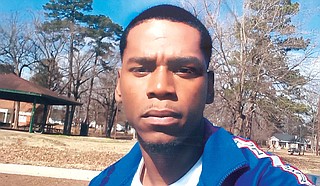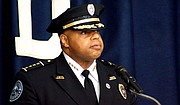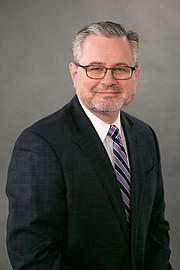Tuesday, September 15, 2020
On Feb. 14, 2019, Mario Clark’s mother called Jackson police to transport him to the hospital due to a psychotic episode. Jackson police officers are now accused of killing him instead. Photo courtesy Mario Clark Family
Mario Clark's mother, Sheila Ragland, regrets calling 911 on Valentine's Day, 2019. She wanted Jackson Police Department officers to transport her son to the hospital because he was having a psychotic episode. Doctors had diagnosed him with paranoid schizophrenia when he was 13.
The police handcuffed and shackled Clark, she said, then beat and kicked him on the head. He died six days later. He was 31 and left behind a daughter. The City fired the officers involved, but the Civil Service Commission reinstated them. Mayor Chokwe A. Lumumba said in June that his administration is seeking to reverse that decision even as Clark's family continues to demand the officers' arrest and murder prosecution.
One in four killings in police officers' hands involved someone with mental-health issues, the Treatment Advocacy Center, based in Arlington, Va., reports.
For an eight-hour shift in Jackson, a police officer receives an average of 20 calls, JPD Deputy Chief for Administration Joseph Wade said Aug. 6 at the maiden meeting of the Jackson City Council's law-enforcement ad-hoc committee. About half of those calls have no direct bearing on law enforcement, such as Mario Clark's case.
"Are there ways that we could bring in different civilians to respond to some of these calls so that we can have officers more focused on the really important investigative work, the real important work?" Ward 2 Councilman Melvin V. Priester Jr. asked.
Wade, a 25-year veteran of the force, agreed with the suggestion, saying the City needs an alternative avenue to respond to the community's needs. The police, he said, are ill-equipped to respond to every issue.
Not Law Enforcement-Related
"Yes, there are some things that we need to respond to that are not law-enforcement-related," Wade told the committee. "We must be able to look at the system, probably vet those calls and have another additional resource for that individual."
"Maybe some calls don't require a response," he noted. "Where there is no threat of injury to the person, maybe that is handled by a civilian to keep that officer free for patrol operation or for those situations where his or her response is needed."
The discussion covered the challenges of dealing with homelessness, drug addiction and mental-illness issues in the city, all of which the police get calls to attend to.
"Across the city, you see the homeless population increase across the city, drug abuse—we are seeing increasing numbers of those issues," JPD Chief James Davis said at the special meeting.
He said people with mental illness are indiscriminately dropped off in the city.
"I met with the state (government), I cried out for some help," Davis said. "What I am hearing is that the state hospital shut down, so the streets and the citizens (are) plagued with this problem." He is referring to Mississippi State Hospital that treats mentally ill patients, some of whom are indigent and homeless. MSH's Public Relations Director Kathy Denton denied the allegation. "We have responded to these rumors many times over the years," she said.
"It wasn't true, and it's not true now."
Downtown Mayhem
City Council President Aaron Banks of Ward 6 said at the special meeting that, after getting a tip, he watched on Aug. 19, 2020, as someone he believed to be mentally ill was dropped on High Street .
"I watched a black unmarked car with tinted windows, and (someone) got out and opened the back door, and a guy got out of the car that was talking to himself," he said. Within 30 minutes, the same scene repeated thrice, Banks added. "Someone said, 'just watch'; they are literally taking them out of the state hospital, out of whatever, and dropping them off right here in Jackson," Banks said. "And the first person to respond, and I was just watching, was a capitol or state police person, and the guy was just talking to himself."
Capitol Police, however, could not confirm if this is true, with two of the officers telling the Jackson Free Press that they have no knowledge of such an event.
Banks, however, lamented that the State of Mississippi has long engaged in this practice, which is an ongoing discussion issue. "There are some things that we have to address with the State," he said.
"But it is always an ongoing fight."
In 2017, U.S. District Judge Keith Starrett said the Mississippi Department of Corrections had dropped off a former inmate on Highway 25. A vehicle that was supposed to pick him up and drive him 153 miles to Columbus never showed up.
Savannah Willies, who has spent 25 years in Jackson, made a presentation at the recent council meeting. "I work downtown, and we are seeing an increase of people with mental disorders being let loose on downtown," she said.
The Mississippi Department of Human Services later told this reporter she had no comment about the alleged practice.
Dealing with Mental Illness
Families as Allies Executive Director Joy Hogge, who is an expert on children with mental-health challenges, warns that when a police officer interacts with persons with mental illness, it creates the false notion that they are prone to violence. She faulted the system in which the police are the primary response in such situations.
"One thing that is important to keep in mind is that most people with mental illness are not going to break the law and are not going to be violent," she said in an interview. "So when the police, because we don't have everything else set up the right way, have to respond to situations when someone has a mental illness, then it starts reinforcing that stereotype that mental illness is associated with violence and crime."
Mississippi does not have the full complement of services needed to attend to mental-health challenges, Hogge said.
Resources put into institutionalizing people who are mentally ill could be put into community support, creating a more robust mental-health system and taking the stress off the police, Hogge added.
"In Mississippi, there is a lawsuit that the State lost about different components of the mental-health system not working well enough together for us to have the right kinds of services in the community for people with mental illness," she said. "We don't have the range and depth of services that are needed; it's more likely that the police will end up being called into a situation where it is really not their area of expertise."
She said more police and sheriff departments committing to crisis-intervention training would bring progress. "This is definitely an issue and a whole lot to look at, but there are some promising practices, and one of the most helpful programs for law-enforcement training is the crisis-intervention training," she said. "It is the kind of program developed specifically for law enforcement for them to know how to interact with people with mental illness."
"The more that we can turn to programs like that, the better, and our state has in some ways prioritized that," Hogge said.
"The Mississippi Department of Mental Health has put a lot of effort into making sure that is made available to law enforcement officers in Mississippi."
Hogge, however, said only a small number of police departments had undergone the training. "It's just been in spots. It's not widespread," she said.
Under The Bridge
Chief Davis said it is now common for a person with a mental illness to claim to own a house that is not theirs and run the real owners out. And with no provision for a medical personnel to attend to such people, they are left on the streets. "Same thing (with) drug abuse," he said. "Up there in north Jackson and I-55 corridor, (we have) a lot of the homeless population."
"The locations where they are at are the locations that are governed—under the bridge—by the State of Mississippi, the Department of Transportation," the chief continued. "They are the ones that govern that location."
Retired FBI Special Agent in Charge Christopher Freeze, who served as the executive director of the Mississippi Department of Human Services last year, calls for partnerships to help homeless people living under bridges. He wants police working with behavioral health centers, the Department of Mental Health and the community: "Let's just assume that if JPD is correct, and there are two different agencies who have some responsibility. That just goes back to the emphasis on partnership."
"You can say it is not my job, it is not my responsibility, or you can find a way to address that in the right manner, that might mean doing things beyond what you normally do to provide an answer," he added.
Freeze, who now writes and consults about the effects of trauma on young people in particular, calls for strong leadership to arise to address these problems with the needed time and money to build strong relationships, as well as police training in de-escalation techniques.
"How much money are we going to invest in mental-health training, working with our social partners and the community on these issues versus just doing what we've always done?" Freeze asked. "To some extent, you cannot replicate or replace the police. You are going to have a police presence. The question is, what are the expectations of the police, and what do we want them to be engaged in?"
Jackson's former FBI leader calls for a change in paradigm from putting forth the police as the main responders to having more social workers involved. "The society has decided that police as first responders are going to have to deal with mental illness," he said. "Until we change that paradigm to where we have more social workers involved and a better structure, yes, the police are going to have to be prepared to train to go out and address it."
Without the proper training in trauma-informed policing and how negative childhood experience and trauma influence behavior and adequate connection with community partners, the options the police have dealing with different situations are severely limited, Freeze asserted.
"If you don't have training in being trauma-informed, in understanding what your resources are and how you can get help from the community partners, with social working with mental health, it's either you don't do anything, which is not an option, or arrest somebody, taking them away," Freeze said in the interview. "That is generally not the best help for someone who has a mental-health challenge."
Issues with homelessness, Freeze emphasized, is beyond not having somewhere to stay. "It's been shown that a number of the homeless individuals have mental-health challenges; a number of them suffer from post-traumatic stress disorders," he said. "That adds to the issues."
This, he argues, makes it compulsory for the police to be better equipped.
"Police have to deal with the issues," Freeze said. "When somebody is homeless and living in front of a store, when somebody is homeless and sleeping on a park's bench, when someone is engaged in petty theft or other thefts as they are homeless, who gets called? The police, whether they are the right person or not, get called."
Freeze said there is an urgent need for the City to invest in alternatives to the current traditional policing practices. "You can invest in addressing it appropriately, even with limited resources that we all have, or you can say we (are) going on this path we have been going, and I think we all agree that is a recipe for disaster," he said.
Having society better address mental illness, Freeze said, would be beneficial to the police because people with mental illness have an increased chance of being armed when involved with a confrontation with the police.
"Research shows that when officers are responding to individuals that have been diagnosed with mental-health issues, the chances that that individual has a weapon with them go from 4 percent to just over 40 percent," he said. "So all of a sudden, the mental illness itself contributes to a potentially violent situation."
Freeze said it is better to figure out how to help someone with mental-health issues long before it leads to a violent confrontation between them and the police.
Like many, Freeze has also heard stories about persons with mental illness dropped off in downtown Jackson. "I have heard that rumor before. I don't know for a fact if that happens," he said.
What San Francisco Did
In June, on the heels of the killing of George Floyd in police custody, San Francisco Mayor London Breed decided that police in her California city would stop responding to non-criminal calls.
If such a measure were in place in Jackson, Miss., it would mean about half of the police's time would be freed, based on Wade's comment that about the 10-in-20 calls they get have nothing to do with traditional law enforcement.
"San Francisco police will stop responding to neighbor disputes, reports on homeless people, school-discipline interventions and other non-criminal activities as part of a police-reform plan," the Associated Press reported.
"Mayor London Breed said in a news release that on calls that don't involve a threat to public safety, police would be replaced by trained, unarmed professionals to limit unnecessary confrontation between the police department and the community."
The San Francisco mayor said poverty is the cause of many different issues leading to police calls.
"We know that a lack of equity in our society overall leads to a lot of the problems that police are being asked to solve," she said in the release. "We are going to keep going with these additional reforms and continuing to find ways to reinvest in communities that have historically been underserved and harmed by systemic racism."
Breed said her city will develop a plan in the next year to involve social workers and mental-health workers to respond to disturbances that are not criminal in nature as part of a community-based crisis program, following the model practiced in Eugene, Ore., called Crisis Assistance Helping Out On The Streets program.
An Alternative To Police Response
"You call 911, you generally get the police. It's a one-size-fits-all solution to a broad spectrum of problems from homelessness to mental illness to addiction," NPR said in a report in June, highlighting the Eugene, Ore., program. "Protesters are urging cities to redirect some of their police budget to groups that specialize in treating those kinds of problems."
Ebony Morgan, part of a non-police crisis response team working from White Bird Clinic in Eugene, told NPR that she believes the police are over-used as an immediate response.
"I came into this work passionate about being part of an alternative to police response because my father died during a police encounter," Morgan told NPR. "So it matters to me very much."
That city directs 17% of 911 calls to the program, estimated to save $8.5 million per year because they replace the police and emergency medical response services in those situations. Eugene's yearly police budget is $70 million. Still, the total cost of CAHOOTS—$1.2 million—is a fraction of that and covers both Eugene and Springfield, Ore., which has a $90-million police budget. Jackson, in comparison, has a police budget of $38 million for 2020.
The CAHOOTS program fielded 24,000 calls in 2019, and it called for police backup in only 150.
"You know, in 30 years, we've never had a serious injury or a death that our team was responsible for," Morgan said. "And I think that's important to note."
"(I) try to acknowledge where I believe there is room for improvement," she said. "And I think that models like this can help people have support in their community and feel safer within their community."
The most frequent types of calls in Eugene are for various forms of assistance.
"The most common types of calls diverted to CAHOOTS from the police are welfare checks (32.5% of all CAHOOTS calls), public assistance (66.3%), and transportation to services (34.8%). Some of these crisis responses involve more than one call type," a document explaining the program said. "By diverting crisis calls that can be more appropriately handled by a CAHOOTS team, the CAHOOTS program takes a substantial load off of Eugene Police Department (EPD)."
Olympia, Wash., is following the same route as Eugene. "(Over) a year ago, Olympia started taking a different approach to nonviolent incidents caused by someone experiencing mental illness, addiction or homelessness," themarshallreport.org reported. "Instead of sending armed officers to respond, the city dispatches "crisis responders" to diffuse the situation and connect the individual with services—a model now being considered by a growing number of cities across the U.S."
The report said this approach helps to prevent the incidents of police brutality.
"Using civilian first responders instead, advocates of this approach say, keeps interactions from escalating into violence, and diverts people from jail and toward social services. It also frees up police resources to focus on more serious crime," the Marshall Project report explained.
Albuquerque, N. M., set up a similar initiative in June 2020, creating a community-safety department to deal with nonviolent 911 calls.
Police: Part of Intervention
Urban Peace Institute Senior Consultant on Conflict and Violence Ron Noblet said social workers are better at handling issues relating to mental illness, homelessness, drug addiction and domestic violence. But police have increasingly been saddled with those issues in the past few decades in the United States, he added.
Interpersonal violence, as opposed to crime between strangers, is especially sticky. In a phone interview last week, the Los Angeles-based violence and policing expert told the Jackson Free Press that based on his 50 years of experience in violence mitigation, he judged police as ineffective in de-escalating domestic violence, for instance.
"Domestic violence is extremely tricky," Noblet warned. He was a lead researcher on the Legislature-funded BOTEC Analysis Corp. study of Jackson violence released in January 2016.
"Police, more often than not, can make a domestic-violence situation worse because they have not been trained to handle the situation properly."
"Often, a combination of a policeman with a social worker is far more effective in a domestic-violence situation," he added.
Noblet lamented that such situations are "explosive," and the police training to come in and "exert control" is the wrong approach. "A social worker is trained to de-escalate a situation through words; a police officer is trained to control the situation, not to de-escalate the situation," he said.
"My concern is that police more often than not will escalate a domestic-violence situation, rather than de-escalate."
Drug addiction and mental illness sometimes go together, Noblet observed. Making the police the face of resolving this issue is not appropriate.
"Many mentally ill people use drugs as a way to self-medicate," he said. "A combination of mental illness and drug use is huge in this country. The police are not trained to deal with it."
Noblet observed that cities and counties have, "in the last two generations," stepped back from social services and heaped more responsibilities on the police.
"The recommendation will be to shore up social-service delivery systems, shore up drug-treatment systems, shore up job-development systems," Noblet said. "But it is something that the government almost always says 'oh no, we can't afford that,' but they put the money more and more into (the) police."
Noblet recommends having the police be part of an intervention system, however—rather than shutting them out.
"An intervention system in which a policeman might be part of a team is by far the most effective and the most cost-efficient," he said. "What it will call for is the instant recognition of the type of problem there is and then responding to it with the person who is trained to deal most substantively with the situation."
The violence expert accused public officials of taking the easy way out in merely building up, and funding, the police system as Jackson and Hinds County are doing. The Jackson City Council voted this week to allocate $500,000 to rent more jail space for those committing misdemeanors.
"I think this is a result of two different things," Noblet said. "One: the elected officials are terrified of being accused of being soft on crime, and so rather than doing what they think is right, they do the easy thing and give money to the police."
"Two: In a good part of the country, police are used as a repressive arm of a racist system," Noblet said. "Police are used to repress, to keep people in their area, wherever the area is and to control and are not used to deal with law-breaking."
Need To Act Now
On March 23, Daniel Prude, 41, ran naked out of the house in Rochester, N.Y., in an apparent display of mental illness. Similar to the alleged story of Mario Clark in Jackson, police handling after they found him led to his death. They handcuffed Prude, put a mesh bag over his head, knelt on his back and pushed his face into the ground. The trauma of that event left him brain-dead. His family decided to take him off life support one week later, and he was pronounced dead.
The late Mario Clark, 31, is a poster child of the need for alternatives to policing in Jackson. While he needed mental-health assistance, the police "assisted him" in a different way, by handcuffing and kicking him, his family says. Hinds County Coroner Sharon Grisham-Stewart ruled his death a homicide linked with strangulation and suffocation in the autopsy report.
Prude's brother, Joe, like Clark's mother's, called the police when his brother left the house naked. He now has a name for Prude's experience that led to his death in the hands of the police—lynching.
It has been close to two years since Clark died, and little has happened in Jackson and Hinds County to align crisis calls to the appropriate responder.
Shereake Elder, Clark's sister, expressed deep dismay at those officers' actions at the time of her brother's death, WLBT reports.
"When you go to people's houses, don't be so aggressive," she said. "When you get called to another domestic or a mental-illness call ... handle the situation way better than you did. Because now I'm about to bury my brother next Saturday, that I will never see again."
Also see jfp.ms/preventingviolence. Email Kayode Crown at [email protected]. Follow @kayodecrown on Twitter.




